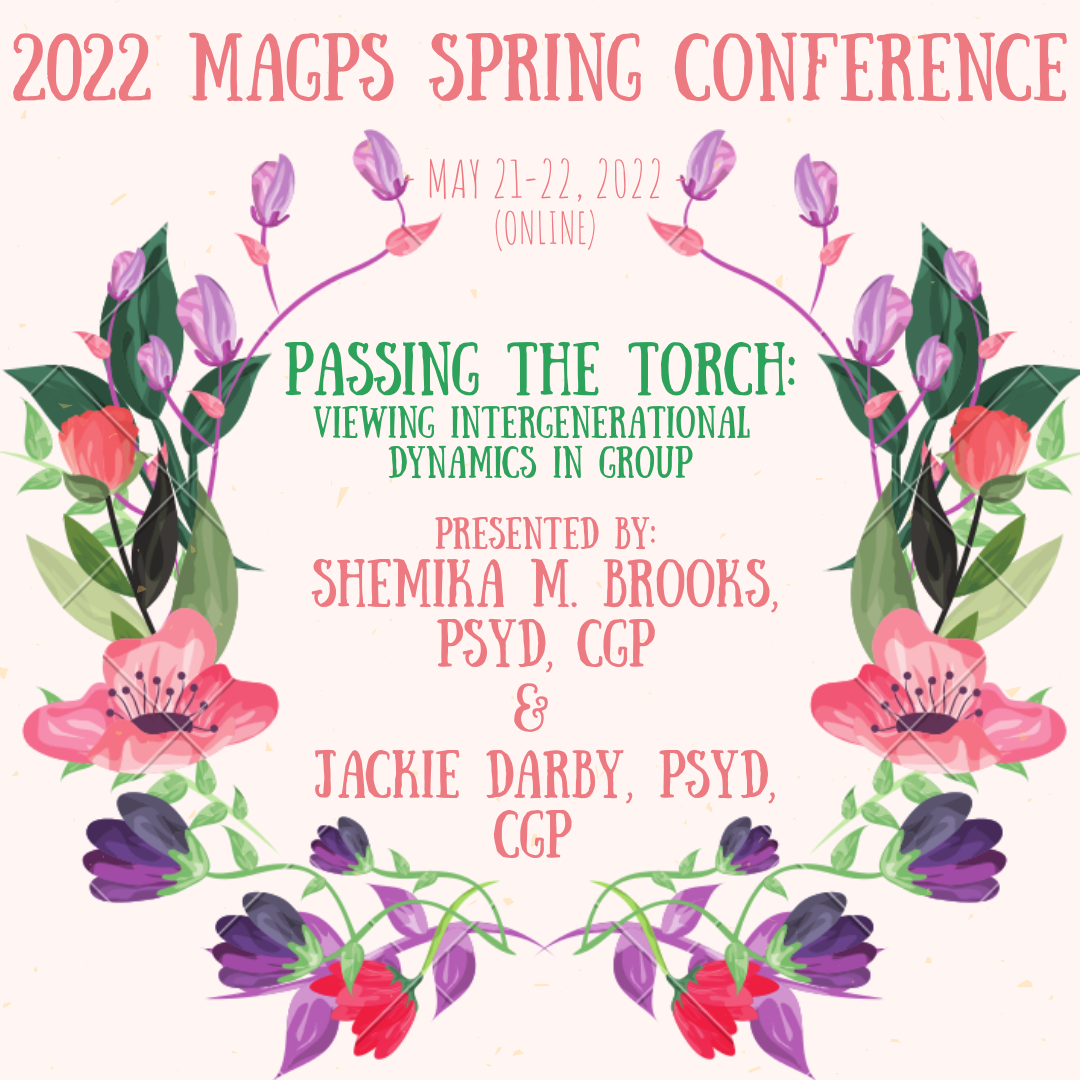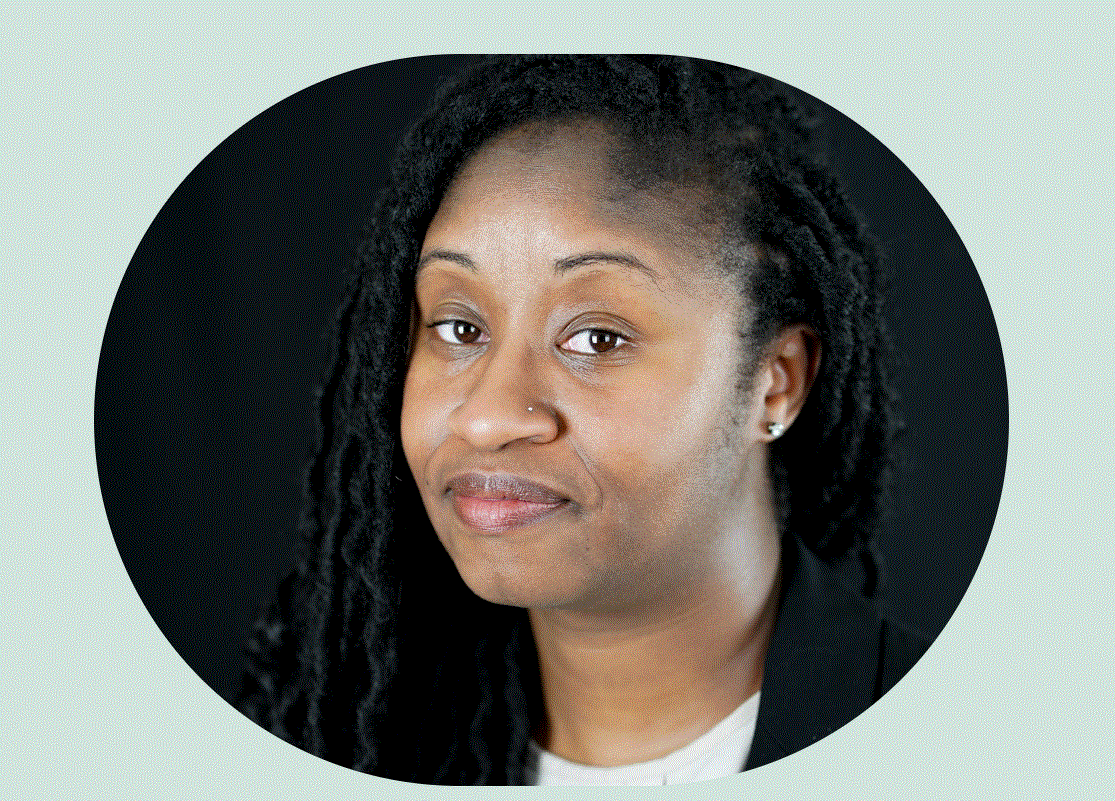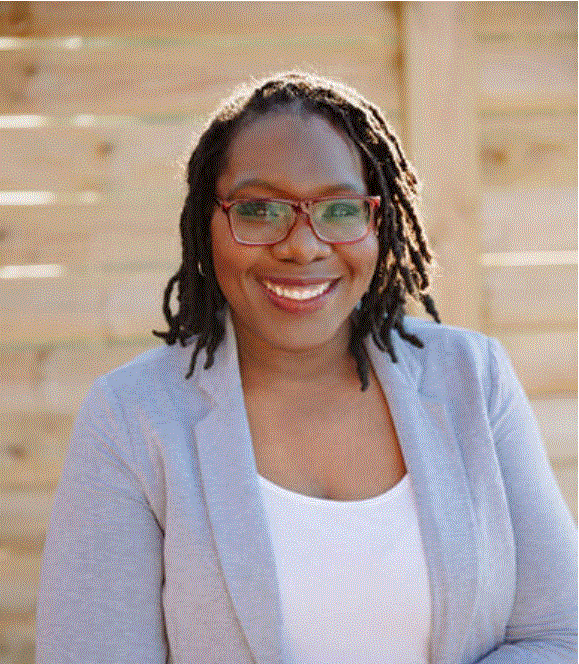 | Mid-Atlantic Group Psychotherapy Society The Mid-Atlantic Group Psychotherapy Society (MAGPS) is a regional affiliate of the American Group Psychotherapy Association that serves group therapists in Virginia, West Virginia, Maryland and the District of Columbia. |
PASSING THE TORCH:
Viewing Intergenerational Dynamics in Group
SPRING 2022 (virtual) conference
May 21-22, 2022
presented by:
Shemika M. Brooks, PsyD, CGP
&
Jackie Darby, PsyD, CGP
 Conference Chairs: Liz Marsh, LICSW, CGP, ATR & 9.5 CE/CME This event is co-sponsored by the Washington School of Psychiatry. | In recent years there has been a great emphasis placed on the ways society views and talks about their generational differences. The field of psychology is not immune to those generational dynamics, especially as it relates to dynamics within groups. It is time that therapists view how intergenerational dynamics appear in group spaces if we are to help society navigate the cultural changes that are happening today. Learning Objectives:
|
Conference Format
It is the mission of MAGPS to establish a safe, unique, creative learning environment for all attendees by hosting conferences that offer both didactic and experiential learning through participating in whole group and small process group weekend. By registering for this conference, you will participate in plenary sessions, individual and whole group discussions, as well as 3 Small Process Group Experiences.
Small Process Group Experiences
The primary task of the small process group experiences at MAGPS conferences is to provide space to integrate the didactic material presented by the guest speaker with one's own understanding of self and the small group process. Process groups provided by MAGPS can be intense educational experiences, but they are not psychotherapy groups. So, while conference attendees may derive therapeutic benefit by participating in a group, we avoid using the group to explore our personal history or underlying dynamics, as one may do in group therapy.
The goals of participating in a small process group experience may be achieved through self-exploration and noticing one's feelings, thoughts and reactions in the "here and now." In addition to observing and reflecting on one's own behavior, one may also give and receive feedback from fellow group members about the experience. Participants may experience firsthand the challenge of joining, finding one’s voice and becoming known, remaining emotionally present and working in the moment, and forming relationships and reflecting on interaction. Small Group Leaders (SGLs) will emphasize bridging experiential learning with cognitive understanding of the group’s development and the conference theme.
Throughout small group sessions over the course of the weekend, challenging dynamics may emerge requiring you to address microaggressions, power and privilege dynamics, effectively manage ruptures, and to the degree possible, restore or repair relational ruptures. While Small Groups can be a powerful learning tool, this experience has harmed colleagues holding marginalized identities in the past. Please review the following recommendations by the AGPA, by clicking on the hyperlinked text: AGPA Guidelines for Creating Affirming Group Experiences before registering for an MAGPS Conference weekend. If you have hesitation about your ability to incorporate what has been identified by the AGPA DEI Task Force into the small group experience, we ask that you circle back with us in the future after you are better prepared.Registration rates and informationConference Fees: Registration Deadline: Cancellation Policy: For registration assistance, or to register by phone, contact our conference registrar Sonia Kahn at registration@magps.org. Education and ScholarshipMAGPS is an affiliate of the American Group Psychotherapy Association serving psychotherapists from DC, MD, VA, and WV. Its mission is to provide and support group psychotherapy training and education. Scholarship Opportunities: MAGPS supports the professional development of students, interns, residents, and clinicians early in their careers by offering various scholarships to cover registration and banquet costs. First-time attendees and new professionals may register at reduced rates. Click here to apply for a scholarship. 9.5 CE/CME Hours The Washington School of Psychiatry is approved by the American Psychological Association to provide continuing education for psychologists. The Washington School maintains responsibility for this program and its contents. The School is approved by the Social Work Board of the State of Maryland as a provider of continuing education for social workers in DC, MD, VA, and WV. The School is approved by the California Board of Behavioral Sciences as provider #5691 of continuing education to social workers in California. The School solely is responsible for all aspects of the program. The School is accredited by MedChi, The Maryland State Medical Society, to provide continuing medical education for physicians. The School designates this conference for a maximum of 10 AMA PRA Category I Credit(s) TM. Physicians should claim only the credit commensurate with the extent of their participation in the activity. Regretfully, CEs for Professional Counselors will not be available for this conference. We hope that the Professional Counselors in our community will still considering joining us without paying the CE/CEU Processing Fee! --- Please Note: Licensing Boards change regulations often and while we attempt to stay abreast of their most recent changes, we recommend you contact your board directly to obtain a ruling, if you have questions or concerns about this course meeting your specific board’s approval. SCHEDULEDay 1: 8:30 am - 9:00 am: Welcome 9:00 am - 10:00 am: Plenary I 10am - 10:15 am: Break 10:15 am - 11:30 am: Small Group 1 11:30 am - 11:45 am: Break 11:45 am -12:45 pm: Plenary 2 12:45 pm - 2:45 pm: Lunch 2:45 am - 4:00 pm: Plenary 3 4:00 am - 4:15 am: Break 4:45 pm - 5:30 pm: Small Group 2 ---------------------------------------- Day 2 8:30 am - 9:00 am: Welcome 9:00 am - 10:00 am: Plenary 4 10:00 am - 10:15 am: Break 10:15 am - 11:30 am: Small Group 3 11:30 am - 11:45 pm: Small Group Debrief 11:45 am- 12:00 pm: Break 12:00 pm - 1:15 pm: Discussion Group 1:15 pm - 1:30 pm: End of Conference Wrap-up | Presenter BioSShemika M. Brooks, PsyD, CGPDr. Shemika Brooks (she/her/hers) is a Licensed Psychologist and Certified Group Psychotherapist (CGP) in Maryland. She dedicates herself to providing trauma-informed integrative care to individuals holding BIPOC and all other identities through the lens of cultural humility. She also works to aid professionals and organizations in developing anti-racist, social justice-oriented, equitable practices. In addition to private practice and consultation work, Dr. Brooks has been the group coordinator at the Johns Hopkins University Counseling Center for over four years. She is one of the founding chairs of the Anti-Racism Task Force (now Anti-Racism Committee) for MAGPS, a chair of the Racial and Ethnic Diversity Special Interest Group (RED SIG) for AGPA, and involved in a host of other organizations and community activities. Jackie Darby, PsyD, CGPDr. Jackie Darby (she/her/hers) is a Licensed Psychologist and Certified Group Psychotherapist. She serves as the Assistant Director of Outreach and Consultation at American University, in addition to being an adjunct faculty member and writer. Dr. Darby founded The Unconscious Shift, a wellness consulting agency that develops and provides mental health wellness trainings for community organizations. Click here to read an interview with the Conference Presenters!
SMALL GROUP consultantsMAGPS traditionally invites seasoned local group facilitators to serve as small group leaders (SGLs), along with at least one guest from another affiliate society in an effort to promote stronger connections with our colleagues across the country. These small group process leaders will serve to help guide attendees take a deep dive into understanding the ways in which they engage with others on an interpersonal level. Participants will be randomly selected prior to the start of the conference. Recommended ReadingsBehn, A., Davanzo, A., Errazuriz, P. (2018). Client and therapist match on gender, age, and income: Does match within the therapeutic dyad predict early growth in the therapeutic alliance? Journal of Clinical Psychology, 74, 1403-1421, 10.1002/jclp.22616 Forbes, M.K., Crome, E., Sunderland, M., & Wuthrich, V.M. (2017). Perceived needs for mental health care and barriers to treatment across age groups. Aging & Mental Health, 21(10), 1072-1078, http://dx.doi.org/10.1080/13607863.2016.1193121 Hawkley, L.C., Wroblewski, K., Kaiser, T., Luhmann, M., & Schumm, L.P. (2019). Are U.S. older adults getting lonelier? Age, period, and cohort differences. Psychology and Aging, 34(8), 1144-1157 Holman, D., & Walker, A. (2020). Understanding unequal ageing: towards a synthesis of intersectionality and life course analyses. European Journal of Ageing, 18, 239-255 Kessler, E.M., Rahn, S., Klapproth, F. (2020). Do young people prefer older psychotherapist? European Journal of Ageing, 17, 119-124, https://doi.org/10.1007/s10433-019-00519-9 Mangione, L., & Forti, R. (2018). Beyond midlife and before retirement: A short-term women’s group. International Journal of Group Psychotherapy, 68(3), 314-336, 10.1080/00207284.2018.1429927 Moore, S., & Krause, A. (2021). Working with generationally similar or different colleagues: Impacts on perceptions of generational stereotypes and work-related attitudes. The Psychologist-Manager Journal, 24(2), 115-139, https://doi.org/10.1037/mgr0000113 Paquin, J.D., Abegunde, C., Hahn, A., & Fassinger, R.E. (2020). A brief history of group therapy as a field and the representation of women in its development. International Journal of Group Psychotherapy, 71(1), 13-80, 10.1080/00207284.2020.1798176 Raymer, M., Reed, M., Spiegel, M., & Purvanova, R.K. (2017). An examination of generational stereotypes as a path towards reverse ageism. The Psychologist-Manager Journal, 20 (3), 148-175. http://dx.doi.org/10.1037/mgr0000057 Van Rossem, A.H.D. (2018). Generations as social categories” an exploratory cognitive study of generational identity and generational stereotypes in a multigenerational workforce. |
Disclosure of Commercial Support and the Unlabeled Use of a Commercial Product: No member of the planning committee and no member of the faculty for this event have a financial interest or other relationship with any commercial product(s) discussed in the program. The Washington School of Psychiatry is an independent non-profit organization. It is not affiliated with the government of the District of Columbia or the government of the United States.

